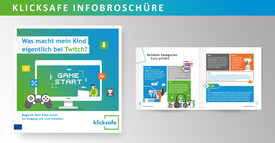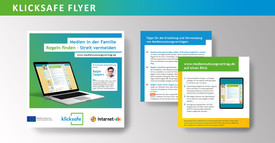Do you know what your child is doing on the Internet?These questions will help you learn more about your child's media use

Children in Germany spend around 43 minutes online every day. Internet use increases continuously with age. While 6- to 7-year-olds spend 17 minutes a day online, 12- to 13-year-olds spend 74 minutes a day (source: KIM Study 2022). What do children do and experience during this time? And how can parents best protect their children from online risks? One thing is clear: media education is a challenging ongoing task, because services and games are constantly evolving. klicksafe provides you with the latest information and news to keep you up to date. But how do you get into a good and regular exchange with your children? We've put together a list of questions for a variety of conversation starters for you.
Framework conditions for good conversations
To encourage your children to talk openly and honestly about their online experiences, we recommend the following:
- Create time and space for conversations: take time regularly to talk to your child about their activities and experiences both on and offline. Listen actively and attentively. Keep in mind that conflicts in the analog space often continue digitally. So if your child talks about conflicts in the schoolyard, ask if there are the same conflicts in the class chat.
- Create a trusting atmosphere: Children should feel safe talking about their experiences. As a parent, you can encourage open communication by showing honest interest at eye level and understanding. Avoid judging or criticizing, but support and encourage your children.
- Be a good role model: Children learn through observation and imitation. Share your own positive and negative experiences. By being open and honest about your own online experiences, you encourage them to do the same.
Smart conversation starters - How to get into the conversation
The following questions can serve as a starting point for an open and honest discussion with your child about their online experiences. They are designed to help you better understand their experiences and how to deal with online risks. This is not a checklist.
Pickquestions that best fit your child's current media use habits.
- What do you like to do most online?
- Which social media apps do you use most often? What fascinates you about them?
- Which social media channels/influencers do you follow? What do you like about them?
- What video or challenge did you find particularly funny/sad/scary?
- What is your favorite game? Would you like to show me how it's done?
- Do you know the people you play or chat with online? Have you ever told strangers your real name or where you live?
- Are you active in online communities or groups? What do you take away from them? Are you sometimes annoyed by them?
- What distinguishes real friends from online acquaintances? How can you tell if someone online is really your friend? How much do you trust online acquaintances?
- Are there certain situations in social media that make you feel uncomfortable?
- Have you ever been insulted or harassed online? How did you deal with it?
- Have you ever experienced someone being bullied? How did you react?
- Have you ever been shown pictures or videos that worried or frightened you? What could you do in such situations in the future?
- Do you sometimes feel stressed or overwhelmed by your cell phone? Do you have any ideas about what you can do about it? Can we support you as a family?
- Have you ever shared content on social media that made you feel anxious? And how did that make you feel?
- How important are likes, comments, or ratings of your posts to you? Why?
- How do you find out what's real and what's fake on social media?
- What can you do if you feel worse rather than better after Insta or TikTok?
- Can we change/improve any rules or agreements we have as a family for your online activities?






